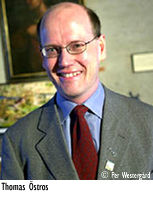Citizens have a democratic right to information on science and technology - Östros
'Most scientists and politicians think that the future lies in life sciences, biotechnology and information and communications technology. But this will not be the case unless the citizens agree,' declared Sweden's Minister for Education and Science and current chair of the EU's Research Council, Thomas Östros, at a conference on the public understanding of science in Stockholm on 5 April. Mr Östros stressed the importance of bridging the gap between scientists and citizens, and of increasing public interest in and knowledge of research in society. 'Knowledge is power, and for that reason it is very important, from a democratic point of view, that everyone has good knowledge of scientific and technological developments,' said the minister. He added that citizens must have an insight into scientific priorities and ethical dilemmas. As taxpayers, they also have the right to know how the government's money is spent and what the results are, he continued. Improved dialogue will not only benefit the citizens, Mr Östros emphasised. Researchers will also benefit as the process could increase public confidence in scientific methods, results and their application. 'A two-way communication would also give the researchers better opportunities to catch the citizens' questions and ideas,' he added. With some regret, Mr Östros also highlighted the paradoxical situation which sees science and technology having an ever increasing impact on the overall economic development and quality of life in modern society and the growing scepticism which greets advances in knowledge and technology. 'The quest for knowledge no longer generates the unquestioning enthusiasm that it did some decades ago,' he said. The minister took the opportunity to explain the Swedish government's view that researchers should enjoy great freedom in their work, adding his own belief in 'freedom of research and in basic research where researchers' own curiosity rules. 'I believe in scientific progress and technological development, but, after all, it is all the citizens together, including the scientists and engineers, who form the future,' Mr Östros concluded.
Countries
Sweden

